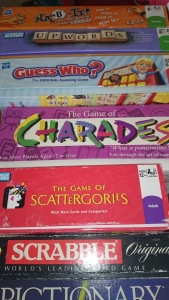The Games People Play … part II …
Posted by diggers27
 So … the 2015 school year is upon us. Like most teachers I have spent part of the Summer “Holidays” reflecting on last year and planning for this year. I have blogged about games in the classroom many times and last year I was reminded on an almost weekly basis about why we should be using games more often.
So … the 2015 school year is upon us. Like most teachers I have spent part of the Summer “Holidays” reflecting on last year and planning for this year. I have blogged about games in the classroom many times and last year I was reminded on an almost weekly basis about why we should be using games more often.
Initially I used games as a reward in my classroom … part of my behaviour management plan. However, as I observed my students last year I became aware that the types of games (mostly old-fashioned card and board games) were not familiar to most of my high school students. They do play games … on computers and electronic devices … usually against the computer or unseen opponents … it is a solitary rather than social experience. The experience of playing in real-time, in real life, with your opponent across the table from you, was not a common experience.
My Professional Goals last year focussed on the Personal and Social Capabilities of the National Curriculum. My weekly games sessions ticked the boxes particularly in terms of self management and social awareness. I watched as students learnt how to negotiate teams, rules and even which games to play. They managed their emotions (to varying degrees) as they won, lost, cheated / bent rules. As they played different games (and even invented their own) they learnt to play / interact with all class members. They set goals about improvement – for example, achieving new high scores each week. Playing games was a real life experiment in how your decisions influence the reactions of others and potentially change relationships.
Some students even wanted to know where I bought the games so they could play them with their family at home!
This is the most valuable homework I could ever hope that my students do. Parents have told me they often feel unable to help their high school-ers with homework … so don’t, play a game with them instead! Challenge their thinking, help with decision-making, show them how to manage emotions. You might even find that some of the relationships (or at least the tolerance) between siblings improves.
As an English teacher, I tended to restrict the games to language based games (scrabble, boggle slam, up words, scattergories, pictionary, charades) or strategy/thinking games (logic puzzles, chess, guess who), however, on reflection, I am going to increase the choices this year. All games require the same personal and social capabilities: negotiation; communication; self-control of behaviour and emotions; social awareness about the skills, abilities, values, opinions and attitudes of classmates.
The unwritten side effect is, of course, the fun the students have! One of my Year 11s told me she ‘lived for Thursday, games day!” She accepted that she had to get through the rest of the week and do all the reading/research/essay writing/etc, but it was bearable because she looked forward to Thursday.
***************************************
What games will you play in your classroom this year?
Posted on January 27, 2015, in Uncategorized and tagged board games, education, english, games, homework, social awareness. Bookmark the permalink. Leave a comment.



Leave a comment
Comments 0